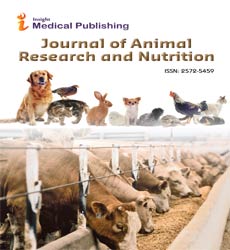Abstract
Evaluation of Locally-available Agroindustrial Byproducts as Partial Replacements to Fishmeal in Diets for Nile Tilapia (Oreochromis niloticus) Production in Ghana
Objective: This study assessed the potential of three widely-available local oilseed byproducts, soybean (SBM), copra (CM) and palm kernel meals (PKM) as partial replacements of fishmeal in Nile tilapia (O. niloticus) diets in terms of their digestibility and effects on growth and nutrient utilization.
Methods: Apparent digestibility coefficients (ADCs) were determined using chromic oxide as an inert marker in test diets formulated to contain 30% of each of the test ingredients by weight and 70% of a fishmeal-based reference diet. The 8-week growth trial evaluated the effects of partial replacements of fishmeal by the oilseed byproducts at different dietary inclusions. The soybean meal diets were formulated with the soybean meal contributing 25% (SBM25) and 50% (SBM50) of total dietary protein. Copra and palm kernel meals each contributed 10 (CM10 and PKM10) and 20% (CM20 and PKM20) of total dietary protein in their respective diets. The test diets were compared to a control diet with fishmeal as the sole protein source.
Results: Nutrient digestibilities of the test ingredients were generally significantly higher for the soybean meal than the copra and palm kernel meals. The ADCs of the soybean, copra and palm kernel meals were; protein, 90.57%, 69.36% and 61.12; lipid, 96.14%, 95.64% and 95.85%; fibre, 96.74%, 77.61% and 55.07% and energy, 91.99%, 73.61% and 75.14% respectively. All the dietary treatment groups recorded significant growth at the end of the trials with the fish in the control and SBM25 groups more than tripling their respective mean initial weights. All the other treatment groups more than doubled their mean initial body weights. Daily growth rates ranged from 1.40% day-1 for the PKM20 group to 2.26% day-1 for the control group.
Conclusion: The study has shown that the test ingredients can partially replace fishmeal in Nile tilapia diets without considerably compromising diet digestibility and carcass traits although higher dietary levels of the oilseed byproducts negatively affects growth.
Author(s):
Kwasi Adu Obirikorang, Steve Amisah, Nelson Winston Agbo, Daniel Adjei-Boateng, Nathaniel Gyasi Adjei, Peter Vilhelm Skov.
Abstract | Full-Text | PDF
Share this

Google scholar citation report
Citations : 764
Journal of Animal Research and Nutrition received 764 citations as per google scholar report
Abstracted/Indexed in
- Google Scholar
- China National Knowledge Infrastructure (CNKI)
- WorldCat
- International Committee of Medical Journal Editors (ICMJE)
- Secret Search Engine Labs
Open Access Journals
- Aquaculture & Veterinary Science
- Chemistry & Chemical Sciences
- Clinical Sciences
- Engineering
- General Science
- Genetics & Molecular Biology
- Health Care & Nursing
- Immunology & Microbiology
- Materials Science
- Mathematics & Physics
- Medical Sciences
- Neurology & Psychiatry
- Oncology & Cancer Science
- Pharmaceutical Sciences

